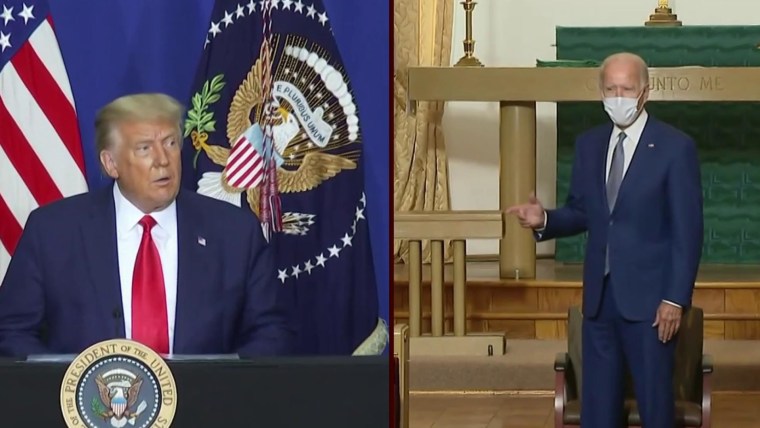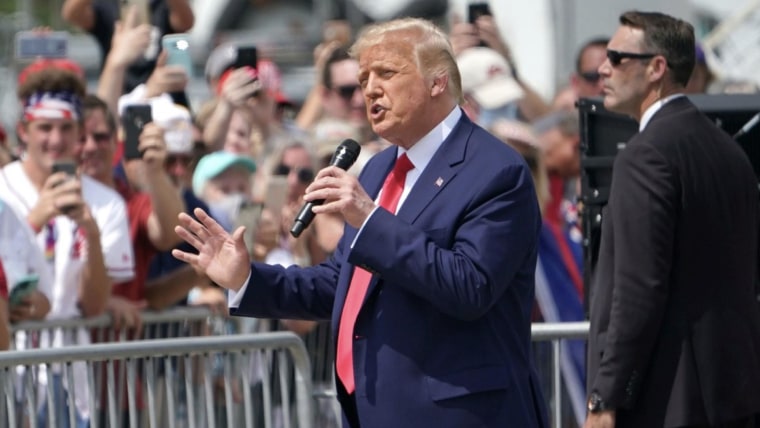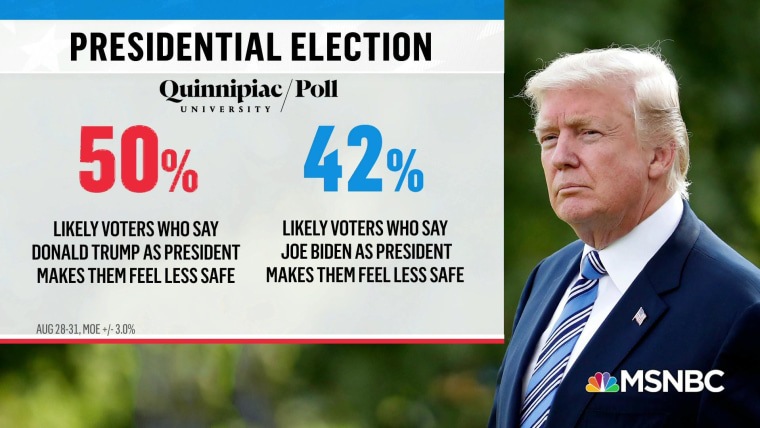WASHINGTON — Joe Biden and Donald Trump traveled to some of the same battleground states this week at nearly the same time, but they campaigned as if they were running in different elections.
When Trump visited Kenosha, Wisconsin, a community consumed by racial turmoil, he met with law enforcement officials Tuesday but not with the family of Jacob Blake, the Black man who was shot in the back seven times by a white police officer. For Biden, a private meeting with Blake’s family — which included a 15-minute phone conversation with Blake himself in his hospital room — was the first order of business as soon as he touched down in the state Thursday.
When he traveled to western Pennsylvania on Thursday, Trump touted record stock market gains and claimed that Americans were “going to have an incredible economic year next year.” Three days previously, Biden was in the same part of the state addressing the tens of millions of Americans who have filed for bankruptcy in recent months.
And in back-to-back events, in two cities named Wilmington, Biden focused his remarks on how the coronavirus affects children, while Trump commemorated the 75th anniversary of the end of World War II and made no mention of the pandemic, which has killed more than 187,000 people in the U.S.
The snapshots from the post-convention campaign trail put into stark relief how differently the two candidates are approaching the three pillars that both sides believe will define the election: the coronavirus, the economy and the social unrest.
Trump and Biden may have campaigned in similar locations this week, but their messages and backdrops couldn’t have been more different: Biden spoke from a former steel mill and a church; Trump appeared from a battleship and an airplane hangar.
And while the president is doing everything possible to turn the page on COVID-19, Biden has made the health crisis and the Trump administration’s response to it a centerpiece of his pitch.
Their radically divergent visions, tailor-made for specific audiences, underscored how both plan to compete on the same turf in the closing weeks.
When Trump traveled to Kenosha, defying local officials’ calls to reconsider the visit, nothing was scheduled with Blake’s family. Instead, the president met with law enforcement and toured damage from riots. The night before, Trump compared the actions of the officer who shot Blake to “choking” on a “3-foot putt” on the golf course.
“I think people are calling for structural change,” Trump said during a community roundtable Tuesday. “That’s the change they want. They want law and order. They want the police to be police.”
Asked whether he believed systemic racism was a major issue in the country, the president accused the reporter of changing the subject. “We should talk about the kind of violence that we’ve seen in Portland and here and other places. It’s tremendous violence,” he said.
Download the NBC News app for breaking news and politics
In a community meeting in Kenosha after his talk of more than an hour with Blake’s family, Biden said Blake’s determination not to let his life-threatening injuries defeat him was emblematic of the nation’s resilience and optimism despite incredible challenges.
“I think ultimately what’s been unleashed in a lot of people is they understand that fear doesn’t solve problems. Only hope does,” he said.
After Biden delivered a blistering attack on Trump in Pittsburgh on Monday, the president’s campaign announced that he would travel to nearby Latrobe later in the week.
“The incumbent president is incapable of telling us the truth and incapable of facing the facts and incapable of healing. He doesn’t want to shed light. He wants to generate heat, and he’s stoking violence in our cities,” Biden said, condemning rioters and looters.
A hallmark of the Biden campaign has been its ability to block out the mostly unsolicited advice of party strategists who have been convinced since the outset that its strategy couldn’t win.
After emerging from a historically crowded Democratic primary field to open the general election with a fairly stable advantage over Trump, the Biden campaign has at times even publicly mocked the backseat drivers who argued that Biden needed to correct his course based on Trump’s strategy.
But entering this week, there was a sense in Biden’s circles that the “bed-wetting” was reaching a crescendo that needed to be neutralized. Hillary Clinton’s shocking 2016 defeat, some advisers feel, has led too many Democrats to believe Trump’s version of reality will win the day.
And amid calls for Biden to more forcefully respond to the president’s efforts to link him to violence in cities, this week proved to be a critical time for the former vice president and his team to send a message: Trust us, and trust the voters.
Most significantly, Biden used his public remarks and quiet example to highlight a contrast his campaign has always felt resonated with voters. Rather than shirk a “law and order” battlefield, Biden tried to flip the script.
“He may believe mouthing the words ‘law and order’ makes him strong, but his failure to call on his own supporters to stop acting as an armed militia in this country shows you how weak he is,” he said of Trump in Pittsburgh. “Having failed to protect this nation from a virus that has killed more than 180,000 Americans, Trump posts all-cap tweets screaming ‘law and order’ to save his campaign.”
Biden talked instead about “safety and security” — broadening their definitions to hit on key focuses for his campaign: the COVID-19 response and restoring the middle class.
“Getting our schools open safely and effectively — this is a national emergency. But President Trump still does not have a real plan for how to open our schools safely,” Biden said in his hometown, Wilmington, Delaware, later in the week.
In Pittsburgh, he said the nation needs both justice and safety. “When we talk about safety and security, we should also talk about the basic security of being able to look your kid in the eye and tell them everything is going to be OK,” he said later.
Meanwhile, in Wilmington, North Carolina, on Wednesday the president courted military veterans, a constituency he hopes will help him win the state in November. He held an event commemorating the 75th anniversary of the end of World War II, standing in front of the USS North Carolina to declare Wilmington the first World War II heritage city in the country.
The president made no mention of the coronavirus pandemic, despite nearly 2,800 deaths in the state and a rise in the number of cases in recent weeks. In the past week alone, North Carolina has recorded almost 12,000 more cases of the coronavirus.
Instead, Trump took aim at Biden just minutes after stepping off Air Force One, telling supporters that his opponent is “stone-cold crazy.” And while his remarks at the battleship were short, at just 15 minutes, the president made time to nod to his “law and order” message by stressing the importance of upholding the rule of law and boasting about his efforts to crack down on protesters who damage monuments.
In Latrobe on Thursday, the president distilled the race into one in which “rioters are voting for Biden, law enforcement is voting for Trump,” and he repeatedly mentioned protests in Portland, Oregon. He also asserted that the U.S. is “rounding the corner” on the pandemic, promising vaccines in the near future, “which are coming along great.”
Privately, Trump campaign officials and allies have acknowledged that anything that steers the national conversation away from the pandemic benefits the re-election effort. And there is a concerted push to focus on “law and order” this month, particularly as early voting gets underway.
But very few voters list crime as their top concern, according to a Reuters/Ipsos poll this week, which found that a majority cited the economy, jobs or health care as their main issues.
Trump aides concede that the fall will be particularly challenging, once the cold and the flu season sends COVID-19 case numbers spiking across the country. It will be more difficult to stay away from the issue as Election Day nears, with health experts painting a bleak picture as cooler weather pushes people indoors.
Both campaigns are expected to ramp up visits to battleground states in the coming weeks, with the first debate set for the end of the month. Next Friday, the two candidates will both be in Shanksville, Pennsylvania, to mark the anniversary of the Sept. 11, 2001, terrorist attacks, but it’s unclear whether their time there will overlap.














